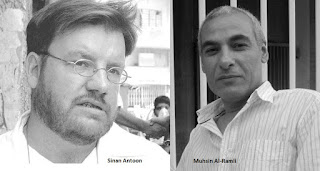Álvaro Abella
Si hay un país árabe que lleva años sufriendo el dolor y los
traumas de la guerra, ese es Iraq. La sinrazón de tres décadas de conflictos
armados, bloqueos, invasiones y destrucción ha dejado su huella en la
literatura de un país que fue la cuna de la civilización mundial. Ya que
estamos repasando la lista de novelas que optarán al Premio Internacional de
Narrativa Árabe 2013, vamos a fijarnos hoy en los dos autores iraquíes que
figuran en la lista: Sinan Antoon y Muhsin Al-Ramli.
Al repasar las biografías de los dos autores, sorprende
descubrir que comparten varios puntos en común. Ambos son de la misma quinta
(nacidos en 1967) y forman parte de la diáspora iraquí (Sinan Antoon reside en
Nueva York desde los años noventa, mientras que Muhsin Al-Ramli lleva años
afincado entre nosotros, en Madrid). Ambos combinan el cultivo de la narrativa
con el de la poesía. Y, por si fuera poco, los dos son reconocidos traductores.
Antoon ha traducido al inglés a grandes poetas como Mahmoud Darwish y Saadi
Youssef, mientras que Al-Ramli ha vertido al árabe a clásicos españoles como
Cervantes o Lope de Vega.
Los dos autores optan a la sexta edición del IPAF con dos
novelas que reflejan el drama y el caos de la existencia cotidiana en Iraq.
Sinan Antoon presenta Ave María ( يا مريم ), publicada por Al-Jamal,
editorial germano-libanesa con sede en Beirut. La novela transcurre durante un
solo día y muestra dos visiones opuestas de la vida, encarnadas por dos
miembros de una familia iraquí cristiana
a los que la situación del país termina reuniendo en Bagdad bajo un mismo
techo. Youssef es un anciano solitario que se niega a emirar y abandonar la
casa que levantó y en la que lleva viviendo medio siglo. Se aferra a la
esperanza y a los recuerdos de un pasado feliz. Maha es una joven cuya vida se
ve desgarrada por la violencia sectaria. Su familia ha perdido su hogar y se ha
convertido en refugiada en su propio país, buscando asilo en la casa de
Youssef. Junto a su marido, espera la posibilidad de emigrar y abandonar un
país que siente que no la quiere. La esperanza se choca con el destino cuando
sucede un evento que cambiará la vida de los dos personajes para siempre. La
novela plantea cuestiones difíciles y ásperas sobre la situación de las
minorías en Iraq.
Por su parte, Muhsin Al-Ramli ha sido seleccionado por Los
jardines del presidente ( حدائق الرئيس ), publicada conjuntamente por las editoriales Thaqafa en Abu
Dhabi y al-Arabiya lil-Ulum Nashirun en Beirut. La obra repasa los últimos
cincuenta años de la historia de Iraq a través del relato de la vida de tres
amigos. El autor explora el efecto que tuvieron las guerras, el bloqueo o la
invasión de Kuwait en la existencia de personas corrientes. Al-Ramli analiza
también la separación existente entre quienes ostentan el poder y los
ciudadanos de a pie. Durante el caos de la ocupación, uno de los personajes
pierde la vida, al igual que muchos iraquíes que se vieron atrapados entre el
fuego cruzado de los leales al antiguo régimen de Sadam y los partidarios del
nuevo orden. La novela ayuda al lector a comprender las complejidades de las
sucesivas tragedias que han asolado Iraq. Se trata de una historia desgarradora
pero narrada con humanidad, en la que la vida termina venciendo a pesar de
todos los obstáculos. En la revista electrónica ILA encontramos una
reseña de la novela en castellano.
----------------------------------------------------------
*Publicado en el blog del arabista y traductor
español Álvaro Abella, (La atalaya del traductor) en 3 de enero de 2013

































